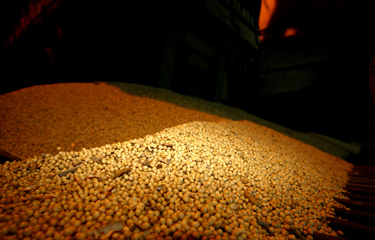Christiansfeld, Denmark-based fish feed producer Aller Aqua has made the decision to eliminate the use of soy sourced from South America in all of its products manufactured in Europe, citing sustainability concerns.
Beginning in 2021, the company will declare the carbon dioxide impact of all the products they make in Europe, according to a press release.
“During 2020, the company stopped using South American soya in its European factories and is instead using 100 percent regionally produced soya from Europe and surrounding countries. By sourcing soya regionally, Aller Aqua addresses the increasing concern of deforestation in certain South American countries,” Aller Aqua CPO and Group Vice President Henrik T. Halken said. ”This deforestation issue has been an increasing concern, not least during 2020, and as we had the opportunity and organizational setup to make the choice of eliminating South American soya from our European production – this is what we have done.”
The company found its CO2 impact could be reduced by as much as 41 percent by exchanging the South American soya for Europe-grown soya, it said, citing calculations by FiBL (Research Institute of Organic Agriculture) performed on behalf of the Donau Soja organization.
“Generally, we focus on sourcing as locally as possible, and I estimate that approximately 90 percent of the raw materials we use in our European factories today, are of European origin. This saves transportation and CO2 emissions,” Halken said. “We are happy to take a leading and active position in creating solutions for sustainability goals both nationally and in Europe, such as the launch of the European Green Deal.”
In H1 2021, Aller Aqua will begin declaring on its labels the carbon impact of all their Europe-produced feeds. Halken said the move will “give Aller Aqua’s customers an opportunity to make an active choice regarding CO2 and help highlight the low environmental impact of their fish production towards both supermarkets and consumers.”
“This shows our customers the carbon footprint that the feed in question has,” Halken said. “We are convinced that our change from South American soya will show significant advantages in terms of a lower carbon footprint.”
Fellow Danish aquafeed producer BioMar also announced changes to its soya sourcing policy on 15 January. It said in a press release that three Brazilian soy producers with which it contracts have moved to a completely deforestation-free and conversion-free supply chain.
Brazilian soybean producers Caramuru, Selecta, and Imcopa had each been implicated in a 2018 report issued by the Rainforest Foundation and the non-governmental organization Future in our Hands as being involved in alleged illegal deforestation, violent and illegal seizures of land, and use of illegal pesticides and slave labor. BioMar said the moves by the three companies means the companies will no longer trade in soy grown on deforested land.
“This bold and historic move sets a new benchmark for global sustainable supply chains and is in stark contrast to larger Brazilian soy traders, who continue to trade deforestation soy,” BioMar said. “As a result, most of the global farmed salmon industry, including the entire European salmon sector, will source soy from Brazilian suppliers whose soybean value chains are 100 percent deforestation- and conversion-free.”
The Aarhus, Denmark-based aquafeed firm updated its soy-sourcing policy in 2019 with a goal toward driving responsible production in its supply chain. BioMar Global Sourcing Director Morten Holdorff Møjbæk said pressure from the aquafeed sector helped drive the Brazilian soy firms to improve their environmental performance.
“This marks the first time an animal protein industry has set such a voluntary and sector-wide benchmark. The participants and stakeholders involved in this initiative hope to inspire other global animal protein industries, such as beef, pork, and poultry to follow suit,” he said. “Today’s announcement is a testament to over a decade of collaboration and shows the result of establishing long-term commitments with Brazilian soy farmers. It also demonstrates the strength of the BioMar supplier approval program (SAAT) and how working together to find solutions can result in systemic change. We hope all supply chains will be inspired to move in this direction of transparency to ensure an open and traceable aquaculture industry.”
Global environmental organizations, including the Rainforest Foundation, applauded the shift.
“The Brazilian soy suppliers and the Norwegian salmon industry show true leadership and sets the new bar for sustainable supply chains,” Ranforest Foundation Norway Senior Advisor Ida Breckan Claudi said. “This historic commitment by their Brazilian soy suppliers will be a game-changer for the sustainability standard for global supply chains. Global pork, poultry, and beef producers are lagging behind, by still allowing deforestation in their supply chain. To stop being complicit in deforestation, the meat industry must follow suit and require their suppliers to become fully deforestation-free.”
BioMar Group Sustainability Director Vidar Gundersen said aquafeed represents a small portion of the end markets for the global soy industry, and that other sectors must follow suit in order to eliminate deforestation due to the expansion of the soy acreage in Brazil.
“This is another good example of our industries ability to drive sustainable change above and beyond legislation for the good of the planet,” Gundersen said. “Soy used in aquaculture feeds represents less than 0.5 percent of the total soy production. We hope this will inspire change beyond aquaculture to soy sourced in other animal feeds and for human consumption. At BioMar, we believe our long-term commitment to working with Brazilian soy farmers was necessary to achieve our target of 100 percent certified soy by 2020 and we are on track to achieving this by the end of the year.”
Other aquafeed producers and salmon farmers have initiated their own programs to halt-soy related deforestation in Brazil, including Nutreco and Grieg Seafood, which has excluded Cargill Aqua Nutrition from receiving and proceeds from its Green Projects initiatives until its parent company significantly reduces the environment harm of its operations.
Photo courtesy of Joa Souza/Shutterstock







